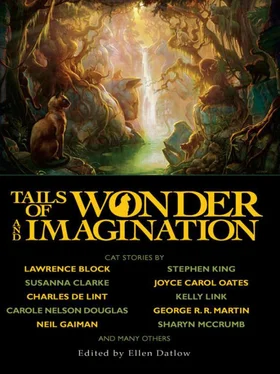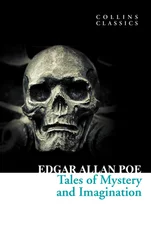Ellen Datlow - Tails of Wonder and Imagination
Здесь есть возможность читать онлайн «Ellen Datlow - Tails of Wonder and Imagination» весь текст электронной книги совершенно бесплатно (целиком полную версию без сокращений). В некоторых случаях можно слушать аудио, скачать через торрент в формате fb2 и присутствует краткое содержание. Год выпуска: 2010, ISBN: 2010, Издательство: Night Shade Books, Жанр: Фэнтези, Фантастика и фэнтези, Ужасы и Мистика, на английском языке. Описание произведения, (предисловие) а так же отзывы посетителей доступны на портале библиотеки ЛибКат.
- Название:Tails of Wonder and Imagination
- Автор:
- Издательство:Night Shade Books
- Жанр:
- Год:2010
- ISBN:978-1-59780-170-6
- Рейтинг книги:5 / 5. Голосов: 1
-
Избранное:Добавить в избранное
- Отзывы:
-
Ваша оценка:
- 100
- 1
- 2
- 3
- 4
- 5
Tails of Wonder and Imagination: краткое содержание, описание и аннотация
Предлагаем к чтению аннотацию, описание, краткое содержание или предисловие (зависит от того, что написал сам автор книги «Tails of Wonder and Imagination»). Если вы не нашли необходимую информацию о книге — напишите в комментариях, мы постараемся отыскать её.
collects the best of the last thirty years of science fiction and fantasy stories about cats from an all-star list of contributors.
Tails of Wonder and Imagination — читать онлайн бесплатно полную книгу (весь текст) целиком
Ниже представлен текст книги, разбитый по страницам. Система сохранения места последней прочитанной страницы, позволяет с удобством читать онлайн бесплатно книгу «Tails of Wonder and Imagination», без необходимости каждый раз заново искать на чём Вы остановились. Поставьте закладку, и сможете в любой момент перейти на страницу, на которой закончили чтение.
Интервал:
Закладка:
“I was en route to the Sudan in the wake of the Khartoum disaster and was bracing myself, so to speak, in the bar of Shepheard’s. I struck up a conversation with an archaeologist fellow just off a dig around Memphis, and the talk turned, naturally, to Egyptian mysteries. The thing that continually astonished him, he said, was the absolute thoroughness of the ancient Egyptian mind. Once having decided a thing was ritualistically necessary, they admitted of no deviation in carrying it out.
“He instanced cats. We know in what high esteem the Egyptians held cats. If held in high esteem, they must be mummified after death; and so they were. All of them, or nearly all. Carried to their tombs with the bereaved family weeping behind, put away with favorite toys and food for the afterlife journey. Not long ago, he said, some three hundred thousand mummified cats were uncovered at Beni Hassan. An entire cat necropolis, unviolated for centuries.
“And then he told me something which gave me pause. More than pause. He said that, once uncovered, all those cats were disinterred and shipped to England. Every last one.”
“Good Lord. Why?”
“I have no idea. They were not, after all, the Elgin Marbles. This seemed to have been the response when they arrived at Liverpool, because not a single museum or collector of antiquities displayed the slightest interest. The whole lot had to be sold off to pay a rather large shipping bill.”
“Sold off? To whom, in God’s name?”
“To a Cheshire agricultural firm. Who proceeded to chop up the lot and resell it. To the local farmers, my dear boy. To use as fertilizer.”
Sir Jeffrey stared deeply into his nearly untouched brandy, watching the legs it made on the side of the glass, as though he read secrets there. “Now the scientific mind may be able to believe,” he said at last, “that three hundred thousand cats, aeons old, wrapped lovingly in winding cloths and put to rest with spices and with spells, may be exhumed from a distant land—and from a distant past as well—and minced into the loam of Cheshire, and it will all have no result but grain. I am not certain. Not certain at all.”
The smoking room of the Travellers’ Club was deserted now, except for the weary, unlaid ghost of Barnett. Above us on the wall the mounted heads of exotic animals were shadowed and nearly unnamable; one felt that they had just then thrust their coal-smoked and glass-eyed heads through the wall, seeking something, and that just the other side of the wall stood their vast and unimaginable bodies. Seeking what? The members, long dead as well, who had slain them and brought them to this?
“You’ve been in Egypt,” Sir Jeffrey said.
“Briefly.”
“I have always thought that Egyptian women were among the world’s most beautiful.”
“Certainly their eyes are stunning. With the veil, of course, one sees little else.”
“I spoke specifically of those circumstances when they are without the veil. In all senses.”
“Yes.”
“Depilated, many of them.” He spoke in a small, dreamy voice, as though he observed long-past scenes. “A thing I have always found—intriguing. To say the least.” He sighed deeply; he tugged down his waistcoat, preparatory to rising; he replaced his eyeglass. He was himself again. “Do you suppose,” he said, “that such a thing as a cab could be found at this hour? Well, let us see.”
“By the way,” I asked when we parted, “whatever came of the wives’ petition for an exorcism?”
“I believe the bishop sent it on to Rome for consideration. The Vatican, you know, does not move hastily on these things. For all I know, it may still be pending.”
THE MANTICORE’S TALE
Catherynne M. Valente
Born in the Pacific Northwest in 1979, Catherynne M. Valente is the author of a dozen works of fiction and poetry, including Palimpsest , the Orphan’s Tales series, The Labyrinth , and crowd-funded phenomenon The Girl Who Circumnavigated Fairyland in a Ship of her Own Making . She is the winner of the Tiptree Award, the Mythopoeic Award, the Rhysling Award, and the Million Writers Award. She lives on an island off the coast of Maine with her partner and two dogs.
She says: “I love the manticore, as one of the composite creatures that generally gets a lot of screentime in games but narrative short shrift. Maybe it’s because they’re cats, and cats are sort of beyond morality. I spent days and days trying to come up with an origin story for them, something that wasn’t: so a lion, a snake, a man and a scorpion walk into a bar… the Upas tree is a real mythological tree, one of the things Darwin actually debunked. I like the idea that a deadly tree could produce deadly creatures—but of course every creature is just trying to find its way.”
Sing, oh, sing, of the sun-muscled Manticore! Thundering fleet are their scarlet feet, and great are their echoing roars! No hunter more patient than we, no serpent so sour-tailed as we, no snarling leaps lighter, no long teeth are brighter than ours—than ours!—on the scrub-spotted deserts of home!
Ha! Let us have none of that. Do not sing of us. We do not want your songs. We will sing, and you will listen.
The desert is wide and white and dry as an old bone. We worry it, we gnaw and tear and peel it bald. And we sing when the moon is jumping on the sand like a skinny white mouse, we sing and the saltbush weeps. The oases ripple under our breath, the blue and clear water where the rhinoceros wrangle, where the cheetah purrs and licks her paws, and the Upas trees waver green and violet in the scalding breeze!
They will tell you the Upas is a death-bower. They will call it the hydra-tree of the desert, and warn that if you sleep beneath it for even a night, you may wake, but to no morning man has known. They will say that three hundred soldiers all in bronze and feathers camped beneath an Upas once, to drink from the clear stream that flowed beneath its branches, and that by the time the sun touched their toes all were dead and cold as dinner. This is ridiculous, a fairy tale. But I suppose it is yet not entirely untrue, for the Upas is our mother, and we are enough of death for anyone. And if soldiers camp under an Upas when she is blowing her seed, it is no fault of the hungry kittens that tumble out if they find their supper plump and laid out on the sand.
Look, passersby—though not too closely!—at the radiant Upas, lover of the Sun in his golden bedchamber, her red branches thick and strong as a haunch, thorny and pitted, her green needles far too glossy and stiff to grow in the thirsty desert. Look at her fruit, nestled in the shadowy forks of her knotted trunk, how scarlet and purple, how thick and full of juice! Touch one at your peril, for these gleaming berries are not fruit but eggs, and it is we that grow within them, in the crimson sacs which wax in the blistering scrub-light, full of the peculiar Upas-yolk we drink and drink, which fills our tails with enough poison for a lifetime, until we rip that silk-thin skin and tumble out head first into the water, or soldiers, whichever seems most convenient.
I remember the Upas-milk. It was sweet, like blackberries and blood.
In the fruit-sac we know all things: how the Sun preened on the face of the oasis-pool, how one Upas, though neither the tallest or most beautiful thing in the desert, opened up her branches and grasped the reddening beams for her own. Her wood warmed and the pool rippled—the Sun would not have noticed if his mirror had not been marred. He would have been angry, and scorched the tree for her theft, had not the first Manticore-fruit burst open before him, and if he did not think the little cub with her needle-teeth and her whipping tail and her sky-bright eyes was the most lovely of all imaginable things, and immediately set about to teaching her to sting and roar and sing and kill, all the things he knew. The Upas smiled, and told her sisters how to follow her lead.
Читать дальшеИнтервал:
Закладка:
Похожие книги на «Tails of Wonder and Imagination»
Представляем Вашему вниманию похожие книги на «Tails of Wonder and Imagination» списком для выбора. Мы отобрали схожую по названию и смыслу литературу в надежде предоставить читателям больше вариантов отыскать новые, интересные, ещё непрочитанные произведения.
Обсуждение, отзывы о книге «Tails of Wonder and Imagination» и просто собственные мнения читателей. Оставьте ваши комментарии, напишите, что Вы думаете о произведении, его смысле или главных героях. Укажите что конкретно понравилось, а что нет, и почему Вы так считаете.












